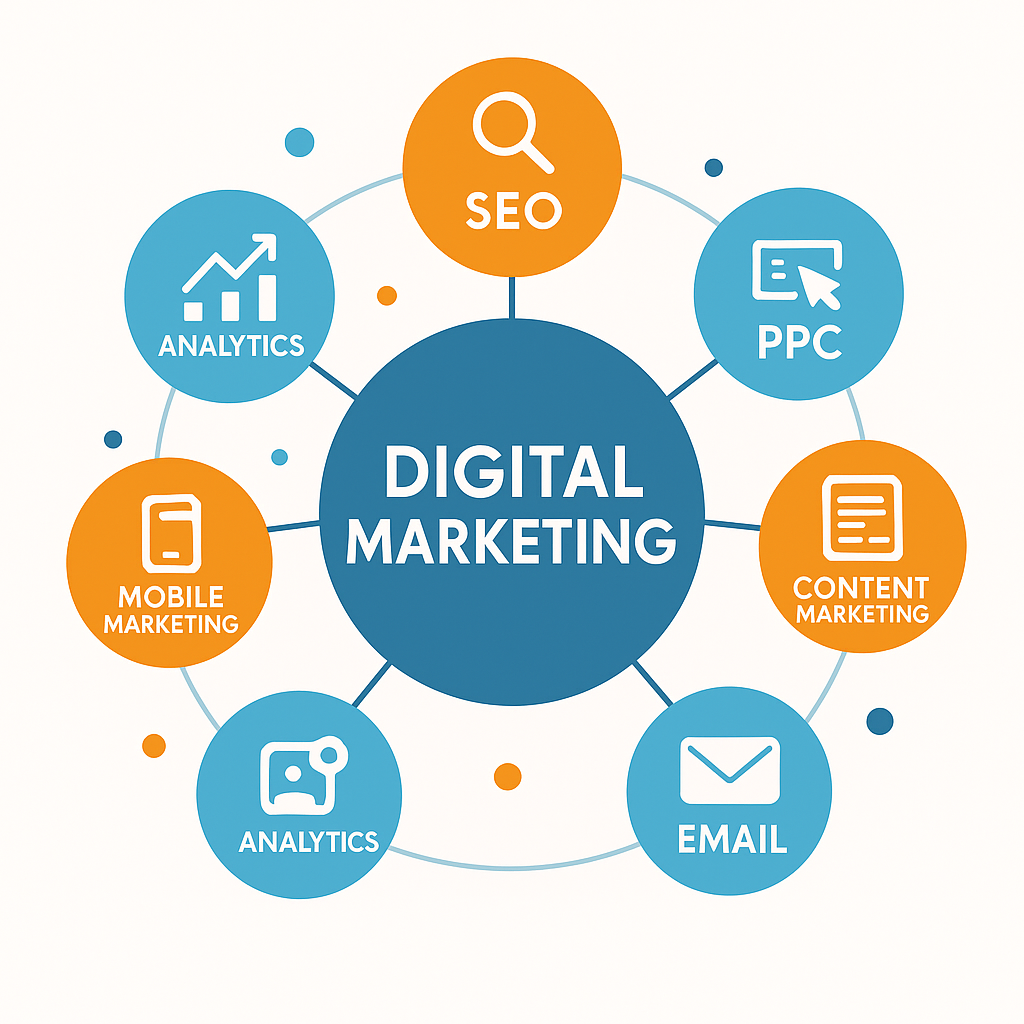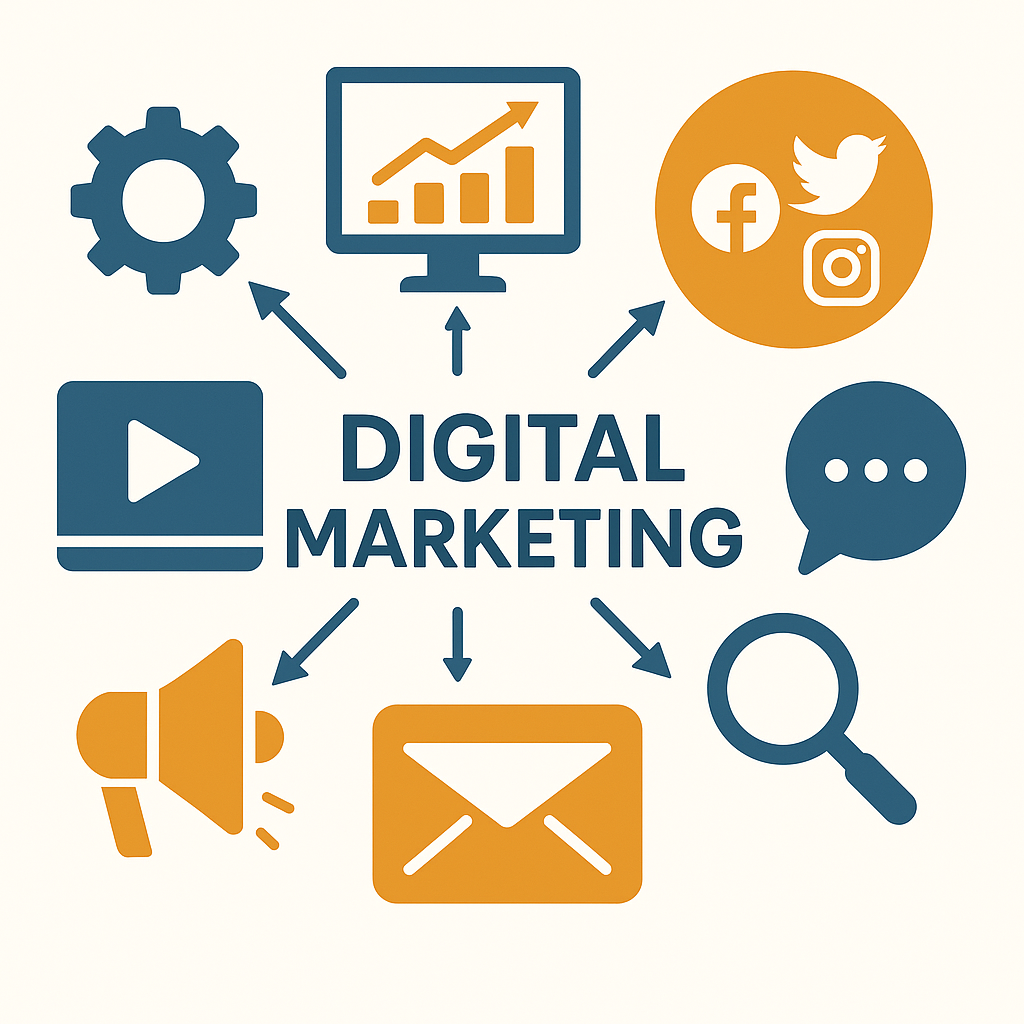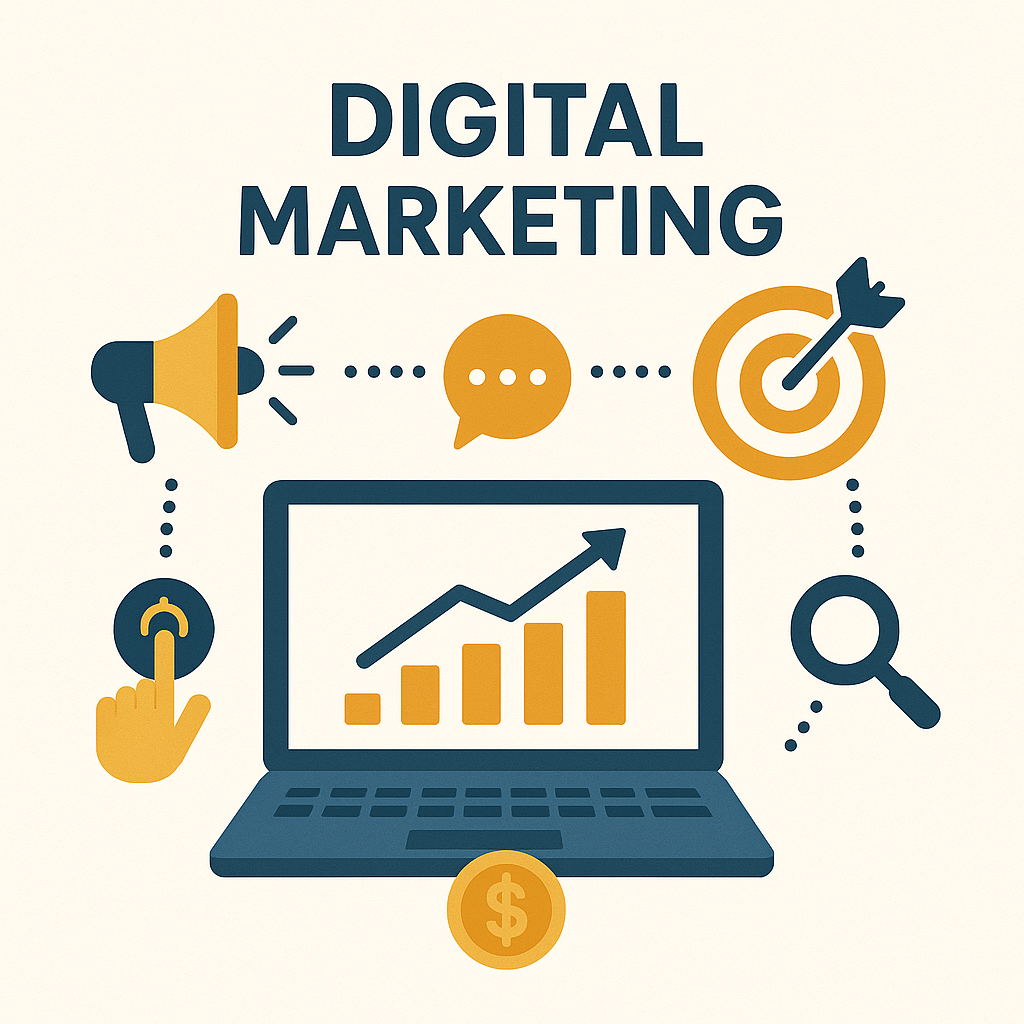In today’s interconnected world, where people spend more time online than ever before, digital marketing has emerged as the heartbeat of modern business strategies. From small startups to global enterprises, digital marketing is not just a choice—it’s a necessity. This comprehensive guide explores the world of digital marketing, its core components, evolving trends, and why it’s a game-changer for businesses aiming to succeed in a competitive landscape.
What is Digital Marketing?
At its core, digital marketing refers to the use of digital channels, platforms, and technologies to promote products, services, or brands to consumers. Unlike traditional marketing, which relies on mediums such as TV, radio, and print, digital marketing operates across online platforms—offering real-time data, measurable ROI, and direct interaction with target audiences.
It encompasses a wide range of strategies, including:
- Search Engine Optimization (SEO)
- Social Media Marketing (SMM)
- Pay-Per-Click Advertising (PPC)
- Email Marketing
- Content Marketing
- Affiliate and Influencer Marketing
Each of these plays a unique role in crafting a cohesive and results-driven digital marketing strategy.

Why Digital Marketing Matters
The significance of digital marketing lies in its ability to connect brands with customers in a personalized, scalable, and cost-effective way. Here’s why it matters more than ever:
1. Global Reach
With digital marketing, geographical boundaries vanish. A small business in a remote town can target and sell products to customers across continents.
2. Cost-Effectiveness
Digital platforms often offer much more affordable advertising options than traditional media. Even with a modest budget, businesses can reach a wide audience.
3. Measurable Results
Using analytics tools, marketers can track every aspect of a campaign—from click-through rates to customer lifetime value. This data-driven approach leads to better decisions and refined strategies.
4. Customer Engagement
Social media, email, and content channels allow businesses to engage in two-way conversations with their audiences, building trust and long-term loyalty.
Core Channels of Digital Marketing
1. Search Engine Optimization (SEO)
SEO involves optimizing your website and content to rank higher on search engines like Google. Effective SEO increases organic traffic and visibility, which is crucial for long-term success.
2. Pay-Per-Click Advertising (PPC)
PPC allows advertisers to pay only when someone clicks on their ad. Google Ads and social platforms like Facebook and LinkedIn offer PPC options to drive targeted traffic almost instantly.
3. Social Media Marketing (SMM)
Through platforms like Instagram, Facebook, LinkedIn, TikTok, and Twitter, businesses can engage with users, build communities, and promote their brand.
4. Content Marketing
“Content is king.” Blogs, videos, podcasts, infographics, and eBooks form the foundation of content marketing, providing value and nurturing leads through the buyer’s journey.
5. Email Marketing
Despite being one of the oldest forms of digital marketing, email remains incredibly effective for nurturing leads, promoting offers, and retaining customers.
6. Affiliate and Influencer Marketing
Partnering with influencers or affiliates helps brands tap into established audiences, creating trust and increasing conversions organically

Trends Shaping the Future of Digital Marketing
Digital marketing is not static. It evolves rapidly with changes in technology, consumer behavior, and market demands. Here are key trends shaping its future:
1. Artificial Intelligence and Automation
AI tools now help marketers analyze data, automate campaigns, and predict customer behavior. Chatbots, smart segmentation, and AI-generated content are becoming the norm.
2. Voice Search Optimization
With the rise of smart speakers and virtual assistants, optimizing for voice search has become essential for SEO strategies.
3. Video Marketing
Short-form videos (think TikTok and Instagram Reels) dominate user attention. Brands are increasingly leveraging video to tell stories, educate audiences, and convert leads.
4. Personalization
Consumers now expect personalized experiences. From custom email campaigns to dynamic website content, personalization boosts engagement and sales.
5. Data Privacy and Trust
In the wake of privacy laws like GDPR and CCPA, businesses must be transparent and ethical in their data practices. Building trust is now a critical aspect of digital marketing.
The Role of Strategy in Digital Marketing
Without a solid strategy, even the most powerful tools fail to deliver results. Here’s how to build an effective digital marketing strategy:
1. Define Your Goals
Are you trying to increase brand awareness, generate leads, or boost sales? Clear goals set the direction of your campaigns.
2. Understand Your Audience
Build detailed customer personas to understand your audience’s needs, behavior, and preferred platforms.
3. Choose the Right Channels
Focus on platforms where your audience spends the most time. Don’t waste resources on channels that don’t align with your business goals.
4. Create High-Value Content
Quality content is the engine of digital marketing. It educates, entertains, and converts. Ensure every piece aligns with your brand voice and audience needs.
5. Measure and Optimize
Use analytics tools like Google Analytics, SEMrush, or HubSpot to track KPIs. Regularly test and tweak your strategies for better performance.

Small Business Spotlight: How Digital Marketing Levels the Playing Field
One of the most transformative aspects of digital marketing is its democratization of opportunity. In the past, only big companies with massive budgets could dominate market share. Today, a local bakery, freelance designer, or homegrown fashion brand can use the same digital tools as global giants to grow their audience and compete effectively.
By leveraging free tools like social media, email automation, and search optimization, small businesses can generate awareness, build relationships, and drive revenue without relying on costly traditional methods.
Measuring Success in Digital Marketing
The beauty of digital marketing lies in its measurability. Key performance indicators (KPIs) help marketers track and refine campaigns. These include:
- Website traffic
- Conversion rate
- Cost per acquisition (CPA)
- Customer lifetime value (CLV)
- Email open and click rates
- Social engagement (likes, shares, comments)
Tracking these metrics ensures your marketing spend delivers the desired ROI and helps identify new opportunities.
Conclusion: The Digital Frontier Awaits
Digital marketing is no longer optional—it’s foundational. As more consumers rely on digital platforms to discover, research, and purchase products, brands that fail to adapt risk becoming obsolete.
Whether you’re a solopreneur building an audience or a multinational scaling your outreach, the right digital marketing strategy can propel your business to new heights. Embrace the tools, stay on top of trends, and never stop optimizing—because in the digital world, change is the only constant.
Leave a Reply